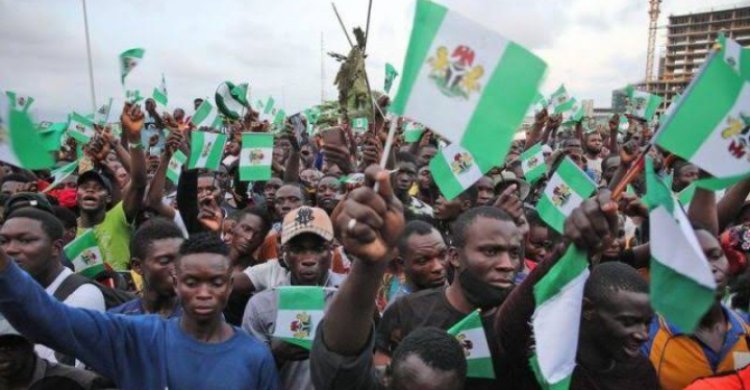Nigerian elections: Eight issues young people want the new government to address


General elections will be held in Nigeria on 25 February 2023 to elect the President and Vice President and members of the Senate and House of Representatives.
This election holds immense significance for young Nigerians, particularly in light of the current economic difficulties, insecurity and their exclusion from the political process and decision making.
Findings indicate that young Nigerians rank the largest declines as follows: media freedom, the representation of women, food security, corruption in the public sector, armed conflict, effective administration, undue influence on government by the political elite, and equality of socioeconomic opportunity.
1. Media freedom
Young Nigerians are deeply concerned about a lack of media freedom. They will want the incoming government to ensure that the media can operate freely in discharging its duties. The media, both mainstream and digital, must be protected by law and the government must ensure digital rights, internet freedom and digital sovereignty (the right of entity to control its digital data) are upheld.
2. Representation of women
Young people want women to be represented better in governance and in parastatals. The incoming government must promote gender equality in its appointments, without compromising on merit.
3. Food security
Food security is another pressing issue raised by young Nigerians. The challenges posed by climate change, such as flooding, drought and cyclones, have made people less food secure, particularly in communities near the Sahel and Lake Chad Basin.
Climate governance policies must be put in place to mitigate the risk. The ongoing conflict between pastoralists and farmers, made worse by the strain on resources, also needs resolution.
4. Corruption
The incoming government must address corruption on both the demand and supply sides. Nigeria currently ranks 150 out of 180 countries on the Corruption Perceptions Index. Corruption requires the collusion of both giver and receiver. Therefore, it is necessary to address the complicity of Nigerian citizens in such activities. Petty and grand corruption in the academic, judicial and administrative sectors needs attention.
Man standing on a platform and waving a flag and surrounded by people raising their hands in protest.
During the EndSARS protest, young Nigerians called for an end to police brutality. Photo by Adekunle Ajayi/NurPhoto. from www.gettyimages.com
5. Armed conflict
Young Nigerians want the incoming government to deal with armed conflict. In the Global Peace Index, Nigeria currently ranks 143 out of 163 countries globally. The causes of armed conflict in Nigeria are multifaceted and include water stress, competition for natural resources, climate change, identity crises, perceived relative deprivation and insurgent groups like Boko Haram. These conflicts are often driven by the proliferation of small and light weapons, porous borders, and ungoverned spaces.
The threat of insecurity looms large over Nigeria, casting a shadow over the prospects of peace and development for young people. The prevalence of police brutality has further eroded public trust and respect for the institution. The police allegedly use excessive force in their attempts to maintain order.
The EndsSARS protests of 2020 were an expression of discontent with the Special Anti-Robbery Squad, which was accused of harassing, brutalising and extorting young people.
The youth-led protests were met with government force. This may influence voting choices in the upcoming general elections.
The incoming government must address the grievances that underlie armed conflict and the factors that fuel it.
6. Effective administration
The government must also promote effective administration and equal socioeconomic opportunity. To close the well-documented equality gap, the government must empower people to succeed in business, agriculture and technology ventures.
7. Undue influence
The undue influence of the political elite, known as “cabals”, impedes transparency and diminishes trust in the government. The new government must run an open system devoid of cabals. It must be accountable and involve young Nigerians in decision making.
8. Equal socioeconomic opportunity
The Nigerian economy is currently beset by a host of challenges, including inflation, rising debt, susceptibility to external shocks, and high unemployment. Recent data from the International Monetary Fund indicates a negative trend across various indicators.
The government must demonstrate a genuine commitment to diversifying the economy by making it more conducive to investment, providing tax relief for tech companies, reallocating infrastructure spending to support local industries, and deregulating the downstream sector.
To help create opportunities for all young Nigerians, education needs attention. Nigeria currently ranks 33rd in education quality on the African continent. At the primary and secondary levels, teachers are underpaid and facilities are either obsolete or lacking. According to UNICEF, there are 10.5 million out-of-school children in Nigeria. At the tertiary level, institutions and researchers are underfunded, lecturers are poorly paid, facilities are dilapidated and appointments are politicised.
The incoming government must increase the budget for education at all levels and encourage new funding models.
Tough road ahead
The incoming government will have an arduous task ahead of it and will have to break with the status quo. Young Nigerians expect a government that is responsive and responsible, one that will rebuild the country and place it on the path to consolidated development.
Failure to meet these expectations will subject young people to poverty and increase their exodus from the country in search of greener pastures.













